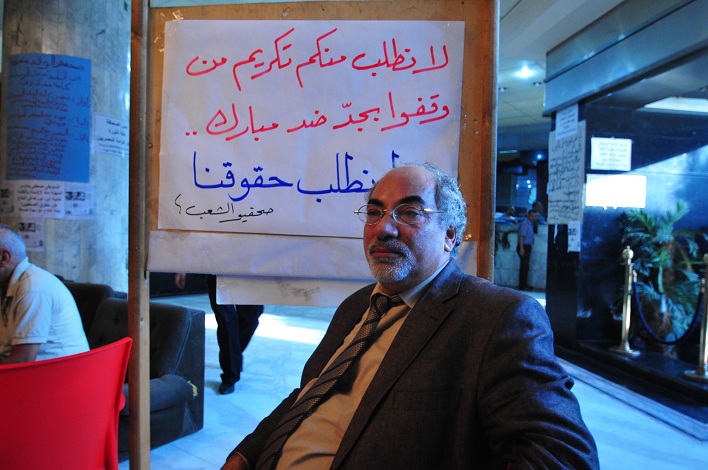BEIRUT: The head of a Syrian-based television channel which has become Muammar Qaddafi’s last platform for the outside world said he had a duty to broadcast the ousted Libyan leader’s comments and promised another video statement soon.
Former Iraqi MP Mishaan Al-Jabouri said he remained in daily contact with either family or close associates of Qaddafi, who he said was in Libya and in good spirits, though he declined to say exactly where.
Jabouri said he was not a supporter of Qaddafi but his channel stood by opponents of Libya’s "occupation" and people had "a sacred right" to hear both sides of the story.
"Today, the media are all reporting NATO’s point of view," Jabouri told Reuters, referring to the Western military alliance which helped Libyan rebels oust Qaddafi from Tripoli last month.
"The other side has no voice… It is our moral and professional duty to deliver this message, whether we agree with it or not," he said by phone from Syria late on Thursday.
Qaddafi has defiantly spoken several times on Arrai TV since losing control of Tripoli on Aug. 23, calling on his supporters to continue their resistance to the new authorities.
"We have in our hands (in Libya) footage of a speech by Qaddafi," Jabouri said, adding it had been recorded in the last 48 hours and would be broadcast as soon as what he called technical problems in Libya were overcome.
Paris-based satellite operator Eutelsat said last week it had no right to switch off Arrai, although local distributor Noorsat had removed another of Jabouri’s channels, Al-Oruba, after being contacted by Eutelsat.
Jabouri said Arrai’s philosophy was to "stand beside any people defending themselves, who want to liberate their land, or who are subject to aggression… wherever they are, in Latin America or the Middle East".
Qaddafi ‘threatened Arrai’
A wealthy businessman, Jabouri was once close to Saddam Hussein’s son Uday but fled to Syria before the US invasion toppled the Iraqi leader in 2003. He returned later and was elected to the Iraqi parliament but left for Syria again to escape corruption charges, which he says were fabricated.
Jabouri says he has funded his television business himself and received no money from Qaddafi apart from $400,000 four years ago and two payments totaling around $50,000 in April and May for broadcast equipment and training.
"I don’t support Muammar Qaddafi. He contacted the Syrian leadership six months ago and told them ‘I will blow up Arrai station if it doesn’t stop (covering) the Egyptian revolution’," Jabouri said.
He also said his station had supported Libya’s uprising when protests first erupted in Benghazi.
Arrai’s Libya coverage is not the first time it has been a source of Western irritation. A leaked cable from the US embassy in Damascus in October 2008, published on the WikiLeaks website, said Arrai was glorifying insurgent attacks on US forces in Iraq.
"Additionally, the station in its editorial capacity seeks to discredit Arab leaders, except Syrian President Bashar Al-Assad," it said. "Now may be the time to call on pan-Arab satellite providers … to discontinue broadcasting Arrai TV."
Jabouri said he was not worried by efforts to shut down his station. "We have come under greater pressure than that. We have been threatened to be blown up by rockets," he said.
Defending its coverage in Iraq, he said Arrai distinguished between support for attacks on US military bases, which he said was legitimate resistance against an occupying force, and attacks on civilians including American contractors or Iraqi translators for US forces, which he said was terrorism.
"Military forces who attack another country, or occupy another land — we call them occupiers and those who attack them we call resistance," he said.
"We are with Qaddafi today because he is fighting attackers. I am not saying Qaddafi was a just leader … But we are talking about an aggression …killing women and children."
